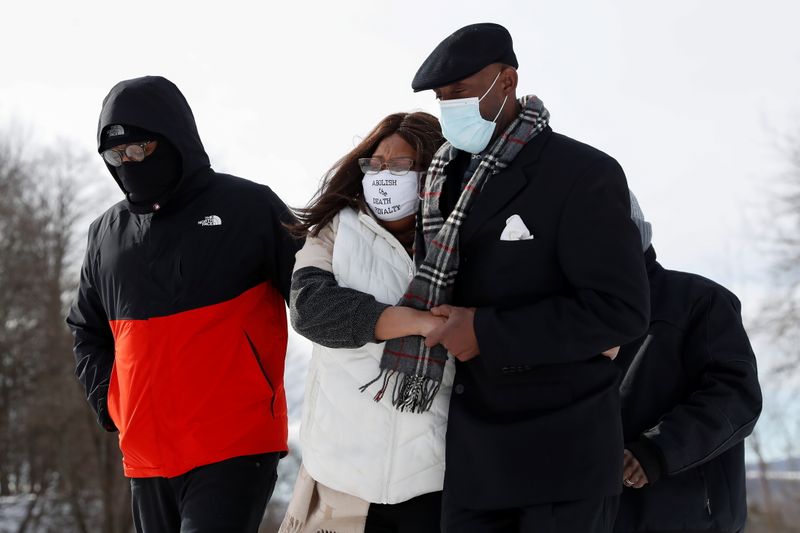By Jonathan Allen
POUGHKEEPSIE, N.Y. (Reuters) - By the grave dug for Dustin Higgs, the 13th and final prisoner executed by former President Donald Trump's administration, a woman began to wail, doubling over and stomping her right foot as his coffin was lowered into the frozen ground.
"They killed my brother!" Alexa Cave said, heaving with tears. Relatives circled around to steady her, and she said it again, loud even above the bitter winds slapping at the green canvas canopy raised over the grave.
Two weeks earlier, Cave had watched through glass as U.S. officials injected Higgs, 48, with a lethal dose of a barbiturate at the Department of Justice's execution chamber in Terre Haute, Indiana.
On Friday, Cave and her family buried him atop a snow-whitened hill in a cemetery in his hometown of Poughkeepsie, New York.
Higgs and an accomplice, Willis Haynes, were convicted at separate trials for the 1996 murders of Tanji Jackson, 21; Tamika Black, 19, and Mishann Chinn, 23, on a federal wildlife refuge in Maryland.
Haynes, who confessed to shooting the women, received life in prison. Higgs, who prosecutors said handed Haynes his gun and ordered him to kill, was sentenced to death. The sentencing disparity has pained Higgs' relatives.
In a statement released just after Higgs' execution, a sister of Jackson spoke of her conflicting emotions.
"On one hand, I felt we were finally going to get justice, but on the other, I felt sad for your family," the statement said. "They are now going to go through the pain we experienced."
The U.S. government revived executions last summer under Trump, a Republican and long-standing proponent of capital punishment, saying that it was authorized by Congress and owed to the victims of the "worst criminals." Before that, the federal government had only executed three people since 1963, though a minority of states still carry out executions each year.
If President Joe Biden has his way, Higgs could turn out to be the last person ever executed by the U.S. government. Biden, a Democrat who took office five days after the execution, has said he will seek to abolish the federal death penalty and encourage states to follow suit.
At the viewing of the body before the burial, some of Higgs' family said they would hold Biden to his promise. Cave greeted arrivals at the funeral home in downtown Poughkeepsie in a white face mask with a black slogan: "ABOLISH the DEATH PENALTY."
One of Higgs' nephews, Harrison Brisbon-McKinnon, had a camera on a strap around his neck and took pictures of his tearful relatives as they approached the open gray casket. It was the first time Harrison, 16, had seen his uncle in person.
"I don't feel release," Harrison said calmly. "I want to end this. No one should ever have to do this again."
An imam arrived, and Cave asked everyone to sit while he whispered a prayer over the body of Higgs, who converted to Islam in prison.
DaQuan Darby, Higgs' 28-year-old son, said he wanted to go back to school to study law. Tierra Darby, Higgs' 23-year-old daughter, was missing her father's frequent calls from prison, asking about her life.
The siblings stood close to each other by the casket, leaning in turn to kiss their father's forehead. "Love you, dad," the son said as pallbearers readied the casket for the hearse.
At the graveside, Cave could not be comforted.

"I can't stay here," she cried, and family helped her away. Harrison, the nephew, photographed the sadness around him. DaQuan stayed back, peering down at his father's coffin.
